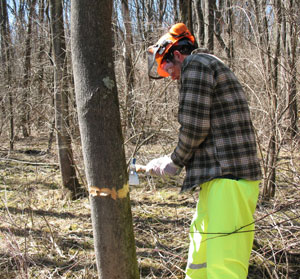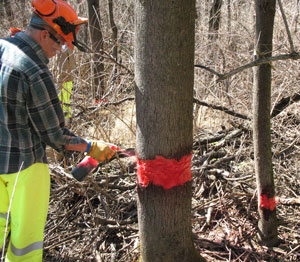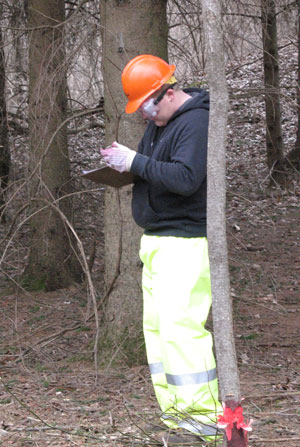 Invasive species such as autumn olive, exotic honeysuckle and ailanthus know no boundaries as where to take root. Thanks to a combined effort by the Pennsylvania Game Commission, Pennsylvania Department of Agriculture and Pennsylvania College of Technology forestry students, fewer invasives are likely to survive on State Game Lands #252 near the Schneebeli Earth Science Center.
Invasive species such as autumn olive, exotic honeysuckle and ailanthus know no boundaries as where to take root. Thanks to a combined effort by the Pennsylvania Game Commission, Pennsylvania Department of Agriculture and Pennsylvania College of Technology forestry students, fewer invasives are likely to survive on State Game Lands #252 near the Schneebeli Earth Science Center.
 On March 28 and 30, the Game Commission; Melissa Bravo, a botanist/weed scientist from the Department of Agriculture; and 34 forestry students engaged in basal application to reduce the population of the invasive species.
On March 28 and 30, the Game Commission; Melissa Bravo, a botanist/weed scientist from the Department of Agriculture; and 34 forestry students engaged in basal application to reduce the population of the invasive species.
The National Fish and Wildlife Foundation provided a grant to help with the process, which involves girdling the trees (cutting through the bark with a hatchet) and applying herbicide to the girdled area. The herbicide travels throughout the tree stem and kills the plant, which allows more desirable species oak, dogwood and hickory, for instance to reclaim the land and provide food sources for wild game.
 Each student used extreme caution: Personal Protection Equipment, safety glasses, rubber gloves, protective pants and safety-toe shoes all were worn during the application. In addition, Bravo conducted a training session to help students understand why herbicides are used, what regulations must be followed when applying them, consequences of improper application and the environmental hazards that must be considered when applying herbicide on public land.
Each student used extreme caution: Personal Protection Equipment, safety glasses, rubber gloves, protective pants and safety-toe shoes all were worn during the application. In addition, Bravo conducted a training session to help students understand why herbicides are used, what regulations must be followed when applying them, consequences of improper application and the environmental hazards that must be considered when applying herbicide on public land.
This was the first of many planned activities to reduce the number of invasive species plaguing Pennsylvania's forests, wild lands and private properties, noted Jack E. Fisher, instructor of forestry in the college's School of Natural Resources Management.
Although ailanthus was the primary focus on Game Lands #252, he said, this is only the first step in invasive control.
Photos by Erich R. Doebler, laboratory assistant for forest technology